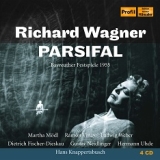Es gibt rund ein Dutzend Aufnahmen von Bayreuther Parsifal-Aufführungen unter der Leitung von Hans Knappertsbusch, die zwischen 1951 und 1964 entstanden. Der Dirigent galt schon als Parsifal-Dirigent schlechthin, als er 1951 entschied, die Wagner-Oper nur noch in Bayreuth zu dirigieren. Kna’s Interpretationen haben sich in all diesen Jahren verändert, aber eigentlich nicht sehr viel. Und zwischen 1951 und 1955, dem Jahr als die Einspielung entstand, die Profil jetzt auflegt, sind die Unterschiede noch relativ gering. Sie kommen vor allem durch die Sänger. Einige sind neu, andere bereits bestens bewährt.
Ramón Vinay singt einen kraftvollen, dramatischen und eher baritonal klingenden Parsifal. Gustav Neidlingers klangvoller, gut dargestellter Klingsor ist ebenfalls bemerkenswert, während mir Dietrich Fischer-Dieskaus etwas gekünstelter Amfortas nicht gefallen will.
Die anderen Sänger, Martha Mödl, Ludwig Weber und Hermann Uhde waren Stützen Bayreuths und sind in einigen Parsifal-Aufnahmen von Knappertsbusch anzutreffen.
Das eigentliche Ereignis aber ist das unvergleichliche Dirigat des großen Kna. Er war der Traditions-Gegenpol zur minimalen Inszenierung des Erneuerers Wieland Wagner und stellte das Bindeglied zwischen der Vergangenheit und der Zukunft von Bayreuth her. Knappertsbusch war Schüler von Hans Richter gewesen, der Wagner zum Lehrmeister hatte. Wie Furtwängler sah dieser Visionär zuerst das Ganze, die inneren Zusammenhänge, bevor er sich an die Detailarbeit machte, und die ging aus seinem Wissen um das globale Gefüge hervor. Gerade dies wird in diesem Bayreuther Parsifal deutlich.
There are about a dozen Bayreuth recordings of Parsifal conducted by Hans Knappertsbusch, all made between 1951 and 1964. The conductor was already considered the Parsifal conductor par excellence when he decided in 1951 to conduct the Wagner opera only in Bayreuth. Kna’s interpretations changed during all these years, but actually not very much. And between 1951 and 1955, the year when the recording was made that Profil now puts up, the differences are still relatively minor. They come mainly through the singers. Some are new, others already well proven.
Ramón Vinay sings a powerful, dramatic and rather baritone-sounding Parsifal. Gustav Neidlinger’s sonorous, well-portrayed Klingsor is also notable, while Dietrich Fischer-Dieskau’s somewhat stilted Amfortas doesn’t appeal to me.
The other singers, Martha Mödl, Ludwig Weber and Hermann Uhde were mainstays of Bayreuth and can be found in some of Knappertsbusch’s Parsifal recordings.
The real event, however, is the incomparable conducting of the great Kna. He was the tradition antithesis to the minimal staging of the innovator Wieland Wagner and provided the link between Bayreuth’s past and its future. Knappertsbusch had been a student of Hans Richter, who had Wagner as his teacher. Like Furtwängler, this visionary first saw the whole, the inner connections, before he set to work on the details, and these emerged from his knowledge of the global structure. This is precisely what becomes clear in this recording.
























